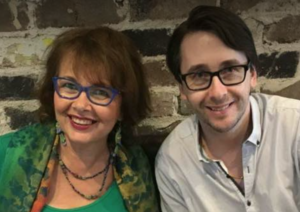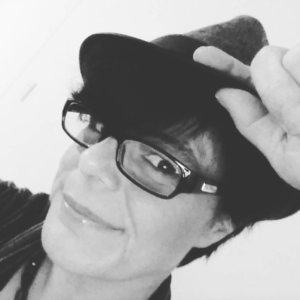Who is MonkeyRead.me?
MonkeyRead.me is a new educational publisher created by teacher, author and illustrator Candy Lawrence and designer, marketer and IT evangelist Brenden Prazner.
What’s your philosophy?

Candy: I believe in respecting children as capable, competent small humans. Our job as adults is to guide them in an authentic way, as we allow them to grow into their true selves and help them unlock their potential.
I dislike the notion that protecting children means lying to them about the realities of life, but I also understand that some conversations are hard for parents and educators to start. So I have used my experience working with children for 30 years and my talents as a writer to create resources for the home and classroom in the form of children’s picture books, with handbooks to guide teachers and parents in their use as they open these important conversations.
Brenden: As a father of two amazing girls I see their potential, but I also see the ever-growing danger of misinformation. As a lover of science and technology, I believe in tackling an issue head on, with the facts, and leveraging from practical experience over imagined theory. I fell in love with the concepts we’re creating because of their frank approach to real issues, and their potential to help build informed, caring and passionate future generations.
What qualifications do you have to be writing about sensitive issues?
Candy: I’m qualified to teach children from birth to graduation age. I started my career as a high school Music teacher and expanded into teaching English, Maths, Performing Arts, Craft and Personal Development from grade 5 to year 12. Then I retrained as as Early Childhood specialist and spent some time as a preschool room leader. I belong to many online education groups and run a number of educational Facebook pages, I present Professional Development seminars for Inspired EC and I blog about respectful childcare at Aunt Annie’s Childcare.
I am also careful to consult experts in the area I’m covering in each book and handbook. So far that has meant consulting someone with a Masters degree in Inclusive Education for ‘Being Friends with Bodie Finch’, a survivor of childhood sexual abuse and several Protective Education agencies for ‘I Won’t, said Willow’, a transgender parent for ‘My Dad’s a Girl’ and an Indigenous descendent of Bangarra for ‘Mean Eric’. I research issues carefully online and through my educational groups to ensure that both my stories and my handbooks encompass best practice and recent research.
Why did you start with a book about autism?
Candy: Inclusive education has been shown to be good for all parties in theory – but in practice, I know from my own experiences in the classroom that it’s a damn hard row to hoe! In particular, the delays in getting qualified support workers into your classroom and in getting children assessed in the first place are making the lives of teachers almost impossible.
So what’s the answer? Resources that are easily accessible, child-friendly, accurate and increase both your own understanding of what’s going on and the support provided for the child by his or her peers. If you have twenty children in your room and two of them have autism – not an uncommon situation – you need the help not only of your staff, but of the other 18 children.
When this situation arose for me the first time, I was not trained in Inclusion in any way, and I was desperate for a resource that would help me explain autism behaviours to the child’s peers. They just assumed he was naughty, and would go home and complain to their parents about this naughty boy who yelled and hit and frightened them. So not only was I dealing with Bodie himself – I was also dealing with upset neurotypical children and their unhappy parents!
When things calmed down a little – when we had support, which took five months of insanity in my room, and when I understood more about autism myself – I was able to ‘translate’ for the other children and the change was magical. Suddenly this child was being accepted and included by his little community. He did genuinely belong and was so much happier.

I wanted to bring that transformation to other teachers and parents, and I could see that the need was urgent. The stress of inclusion is causing some great teachers to leave the profession. So Bodie Finch was born in my mind.
The story wrote itself. The illustrations took a bit longer! It’s based on actual events, though the child is a composite of all the children with autism whom I’ve taught.
The handbook that goes with it was written in consultation with Rebecca Thompson, M.Ed. (Inclusive Education) and contains so much helpful information for teachers and parents to help support the child with autism.
So how has ‘Being Friends with Bodie Finch’ been received by the Additional Needs community and others?
Candy: The response has been fantastic. Parents of children with autism have cried when they read the book, because at last there’s something that might help other children to befriend their child. The pain of being excluded from things like birthday parties is real, and damaging to their children’s self esteem.
Teachers have also been thrilled. They say that the children recognise themselves and their situation in the book, and identify with the characters. As a former music teacher and a lifelong writer, I have a good ear for language and tone, so the voice of Zara comes across as authentically childlike as opposed to being the somewhat idealised version of the child’s voice that permeates a lot of books. Zara’s words come straight from the mouths of the many children I’ve taught.
The book has been endorsed by Early Childhood Australia and praised by parenting expert Maggie Dent, child psychiatrist Dr Kaylene Henderson, occupational therapists, inclusion workers and many, many parents and teachers. I had a whole class of first and second graders write me letters saying how much they liked the book – that was just amazing.
What’s ‘I Won’t, said Willow’ about?
Candy: It’s about protecting children from sexual assault. There are behaviours which are misinterpreted by many adults as ‘naughtiness’ which are actually indicators that something ugly may be happening to the child, or is about to happen to the child.
The statistics on child sexual assault (CSA) are frightening. We have to change the way we approach it with our children. We have to try to stop it before it happens. We can’t – and shouldn’t – watch our children every moment of every day, so we have to prepare them to deal with inappropriate behaviours, especially from adults in positions of trust and from other children who may re-enact their own abuse or act out the porn they’ve been exposed to on less powerful children.
I saw a chink in our protective armour when I considered the fact that many abusers are relatives or friends of the family. Many adults expect that they can touch a small child without asking permission, because they are a friend or relative of the family, and parents tend to let this happen even when the child protests. ‘I Won’t, said Willow’ unpacks this situation.

In conjunction with the handbook, which I’ve written with a survivor of CSA, Sarah Rasdall, it empowers parents to open a conversation with children and draw lines in the sand with relatives and friends. Sarah’s knowledge of research and resources plus her experience leading survivor support groups has been invaluable in the creation of the handbook.
The book teaches children about when it’s okay to rebel against being touched, and what to do if someone asks you to keep a bad secret, ie one that you’re not comfortable with. It shows the different between a surprise, or good secret, and the other type of secret which does not have a happy ending.
So how has ‘I Won’t, said Willow’ been received by the Child Protection community?
Candy: ‘I Won’t, said Willow’ is already being used as an educational text by Deanne Carson of Body Safety Australia with year 1 and 2 classes. The children unanimously rated the story at 10/10 on first reading, except for one child who rated it at 11/10!
You can purchase ‘I Won’t, said Willow at our online shop.
What other stories do you have coming up?
Candy: ‘Mean Eric’ is almost ready to be launched. It unpacks Early Childhood bullying as a taught behaviour. ‘My Dad’s a Girl’ explains gender identity dysphoria. ‘Finn’s Happy Pants’ is about peer pressure and making friends. ‘The Horrible Thing’ takes stressed or traumatised children, such as refugees, through a simple meditation technique. Mrs Baker talks to the class about death in a story called ‘Sometimes Things Die’. There’s also a story called ‘Jasper’s Island’ in which an only child makes his own fun in an isolated situation through the power of imagination. There will be a story about Lily too, and I’m thinking it will be about a gifted child who has social issues, but it’s not written yet!
Read more about Mrs Baker’s class here.